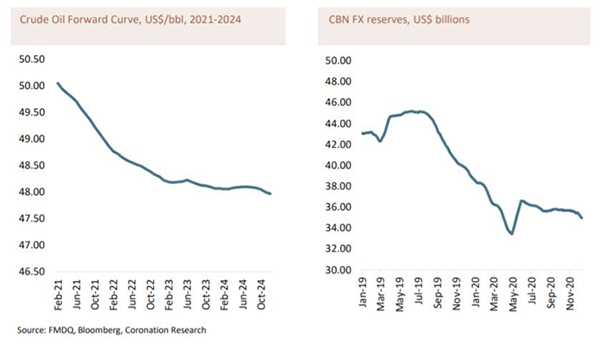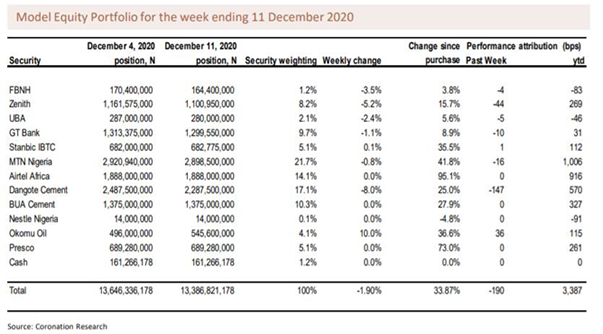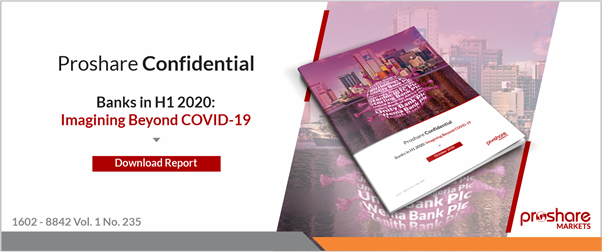Tuesday, December15, 2020 / 10:14 AM / by Coronation Research / Header ImageCredit: Business Today
Last week the price of oil, Brent crude, edged up overUS$50.00/bbl, the first time we had seen this level since March. This raiseshopes of much stronger public finances in 2021 than we have seen in 2020, ifthe rally is sustained into 2021. However, a return to normal, in terms ofpolicies, seems unlikely.
FX
Last week the exchange rate in the NAFEX market (alsoknown as the I&E Window and the interbank market) weakened by 0.01% toN391.53/US$1. In the parallel, or street market, the Naira closed the weeksteady at N475.00/US$1. The N391.53/US$1 NAFEX rate represents a mere 7.5%depreciation during the year to date, the only problem being that liquidity inthis market fell very sharply after March. Although a proportion of demand forUS dollars then shifted to the parallel market, it is notable that, for most ofthe time, the parallel rate has been within 20% of the NAFEX rate (the gap is21.3% now). This is a much better situation than, for example, in late 2016 andearly 2017 when the differences were much larger than this. Our sense is thatpressure on the parallel market rate will not let up over the weeks ahead.
Bonds & T-bills
Last week, the secondary market yield for an FGN Nairabond with 10 years to maturity rose by 36 basis points (bps) to 5.32% and at 7years rose by 44bps to 4.34% while at 3 years the yield rose by 12bps to 1.94%.The annualized yield on 321-day T-bill rose by 36 bps to 0.51%, while the yieldon a 319-day OMO bill rose to 0.52%. The most significant event of the week wasthe Central Bank of Nigeria's (CBN) issue of N4.1 trillion (US$10.5bn) ofso-called Special Bills to banks in respect of sums of excess Cash ReserveRatio (i.e. amounts of CRR held by the CBN in excess of the official 27.5%percentage applied to customer deposits). The 81-day bills carry a yield of0.5%. It was not clear - it is still not clear - how these yields might leakinto the T-bill market. But they appear to have affected market sentiment, withmany participants reasoning that this marks the end of the downward march ofT-bill rates over the past year. On the other hand, liquidity in the marketremains high. So, the next move in short term rates at auction might bedownwards, but market sentiment could be proven correct over the coming months.
Oil
The price of Brent crude rose by 1.46% last week toUS$49.97/bbl. The average price, year-to-date, is US$42.80/bbl, 33.21% lowerthan the average of US$64.08 /bbl in 2019. Brent hit US$50.25 /bbl lastThursday, for the first time since March, edging higher on optimism surroundingvaccinations, the OPEC+ deal and increased demand in Asia. However, the EnergyInformation Administration (EIA) also reported a surge in crude inventories forlast week, up 15.2 million barrels. Although things aren't fully normal yet,the positive signals are strong.
Equities
Last week, the Nigerian Stock Exchange All-Share Index(NSE-ASI) fell by 2.52% with a gain of 27.60% year-to-date to close at34,250.74. Okomu Oil Palm (+10.00%), PZ Cussons (+4.17%) and Oando (+2.50%)closed positive while Lafarge Africa (-10.65%), Ardova OIl (-9.69%) and DangoteCement (-8.04%) closed negative.
Oil at US$50.00/bbl andPublic Finances
Last week the oil price (Brent) crossed the importantUS$50.00/bbl mark. This reflects optimism that global GDP is recovering fromthe Covid-19 pandemic (thanks to vaccines: there is a spike in the number ofdeaths in the US and some European nations). And it reflects the ability of theOrganization of the Petroleum Exporting Countries (OPEC) plus Russia (OPEC+) toenforce at least some level of collective production cuts without which theprice might very well fall below US$40.00/bbl again.
Better still, the forward market is in backwardation,meaning that the long-dated future price is lower than the short-dated futureprice. Market wisdom holds that, under these conditions, traders have anincentive to sell short-dated contracts and buy long-dated ones; this bringsfinancial players into the market. It also gives physical holders of oil anincentive to sell; periods of backwardation tend not to last for long.

As a rule of thumb, Nigeria's public finances workwell when oil trades consistently above US$50.00/bbl. Oil provides (in a goodyear), the Federal Government of Nigeria (FGN) with upwards of 60% of itsrevenue and supplies the country with over 80% of its export earnings. Sincemuch of these earnings are banked by the Nigerian National PetroleumCorporation (NNPC) with the CBN, this is a crucial source of foreign exchange(FX). So, for example, the long period of low oil prices from the end of 2014through to mid-2017 (the price of Brent averaged US$45.10/bbl in 2015 andUS$56.09/bbl in 2017) led to a depressed level of CBN FX reserves. Thisprecipitated two devaluations in the interbank exchange rate, from N199/US$1 toN316/US$1 in mid-2016 and from N316/US$1 to N357/US$1 in August 2017.
Therefore, the recent rise in the price of Brent comesat a good time for the CBN. This year the CBN has avoided the fate it sufferedin 2016 and the first half of 2017, namely a level of reserves below US$30.00bn(the current reported level is US$34.97bn). The cost of this preservation hasbeen a sharp reduction, starting in March, in the CBN's supply of US dollars tothe NAFEX market (until March the CBN had been a generous supplier, to the tuneof around US$1.0bn per month). 2021, with a reasonable hope of an oil priceabove US$50.00/bbl, brings the prospect of improved US dollar inflows.
If an oil price above US$50.00/bbl takes root in 2021it will be tempting to think of the nation returning to normal. Normal, in thisinstance, means a healthy inflow of US dollars from oil that supports therevenues of the government and allows the CBN to be supplier of last resort tothe foreign exchange markets. However, we doubt that the CBN will want toreturn to normal quickly, having made significant changes to its interest rateand foreign exchange management regimes in 2019 and 2020. Building a buffer inits reserve position is likely to be a top priority in 2021, in our view.
Model Equity Portfolio
Last week the market fell by 2.53% with hefty falls inthe bank sector where Zenith Bank fell by 5.2% and in the cement sector whereDangote Cement fell by 8.0%. We were braced for some underperformance, but thenwe noticed that on Friday our notional positions in bank stocks rallied alittle bit. And our notional position in Okomu Oil rallied by 10.0%. Last weekthe Model Equity Portfolio fell by 1.90% compared with a fall in the NigerianStock Exchange All-Share Index (NSE-ASI) of 2.53%, therefore outperforming itby 62 basis points. Year-to-date it has gained 33.87% against a gain of 27.60%in the NSE-ASI, outperforming it by 627bps.

A certain amount of profit-taking in the market isunderstandable, given the significant rally this year. If January 2021 was tobe the month of profit-taking, then it made sense to do it in December. On theother hand, and as we write on page 1, there is no certainty in the directionof interest rates, and the equity market's attractions may endure if interestrates stay low.
In any case, we do not take on the task of predictingthe direction of the market. We buy stocks which we like when their valuationsare cheap relative to other stocks and relative to their own valuationhistories. That is enough to keep us busy.
We plan no changes in the Model Equity Portfolio thisweek.
Relatedto Coronation
- Saving Interest Rate?
- Where is the Money Going?
- CBN Likely to Leave MPR at 11.50%
- Second-best Equity Market in the World
- The Biden Effect
- US Dollar Eurobond Yields Now Higher Than Naira Yields?
- Fiscal and Monetary Response to Events
- Winners and Losers in Africa
- The Return of the Equity Market
- Which Way for Interest Rates?
- Coronation Research Releases Report Themed: From Savings to Mutual Funds
- A Case of Eurobond Market Contagion
- In the Hands of OPECplus
- The Policy Mix and The Markets
- The Oil Price and Production Paradox
- Cracks In The Bond Market?
- No Big Change in FX Policy
- Coronation Research Releases Outlook for Insurance Sector - From Lagoon To The Blue Ocean
- Micro-Insurance, Tech, Key to Deepening Nigeria's Insurance Sector - Coronation Research
- Navigating the Capital Market: The Investors' Dilemma
- Market Interest Rates Back Up - Coronation Research
Related News - Nigeria Economy
- Capital Importation into Nigeria Stood At $1,461.49m in Q3 2020 - NBS
- The Nigerian Manufacturing Sector: MAN Warns of Impending Shop Closure
- HKSAAN2020: Governor Fayemi Highlights How Africa Could Benefit From Its Demography
- Infrastructure Development in Nigeria: The PPP Approach
- Nigeria's Inflation-Galloping Towards 15%
- A Fourth Successive Trade Deficit
- Trade Deficit Expands to a New 4-Year High in Q3 2020
- Trade Grew in Q3 2020 Due to Faster Increase in Imports But Slower Recovery in Exports
- Harvard Kennedy School Alumni Association to Host the Maiden Edition of the Africa Dialogue Series
- FAAC Disburses N639.90bn in October 2020 - NBS
 Lagos, NG • GMT +1
Lagos, NG • GMT +1











 883 views
883 views









 Sponsored Ad
Sponsored Ad
 Advertise with Us
Advertise with Us









